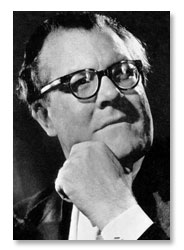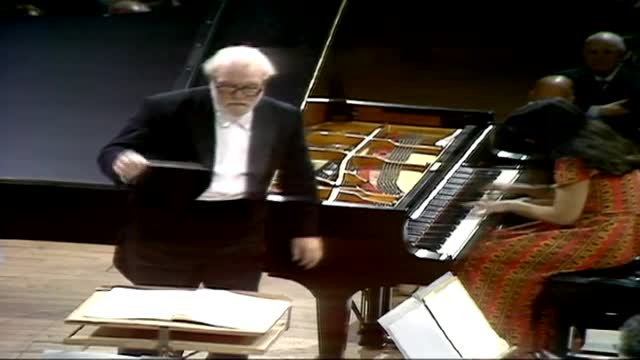
Charles Groves sang in the choir of St Paul’s Cathedral before entering the Royal College of Music to study the piano and organ; while still a student in 1937 he accompanied chorus rehearsals of Brahms’s Ein Deutsches Requiem, conducted by Toscanini. He launched his musical career as a freelance accompanist before swiftly joining the British Broadcasting Corporation as a chorusmaster in 1938, remaining with the BBC until 1951 and holding a sequence of conducting appointments: with the BBC Theatre Orchestra (1942), the BBC Revue Orchestra (1943) and the BBC Northern Symphony Orchestra (1944–1951). Having left the BBC to accept the position of conductor of the Bournemouth Municipal Orchestra, Groves fought to maintain the orchestra when it was threatened with closure, and after it was re-formed as the Bournemouth Symphony Orchestra, under the aegis of the Western Orchestral Society, he became the orchestra’s first chief conductor.
He stayed with it until 1961, when he moved to Wales to become the first full-time music director of the Welsh National Opera; but Groves remained with this company for only two years before becoming chief conductor and music director of the Royal Liverpool Philharmonic Orchestra, a position he held with great success until 1977. In addition in 1967 he became associate conductor of the Royal Philharmonic Orchestra, with whom he toured extensively throughout Europe and America. He was knighted in 1973, and in 1978 he succeeded Charles Mackerras as chief conductor of the English National Opera. Once again Groves did not stay long in an operatic appointment, leaving the company the following year and thereafter pursuing a busy career as a freelance conductor, principally of symphonic music. From 1977 to 1992 he was president of the National Youth Orchestra and from 1988 musical director of the Leeds Philharmonic Society.
At his best Groves was an extremely charismatic conductor, who excelled in the performance of large-scale works. With the Royal Liverpool Philharmonic Orchestra, he conducted the first complete cycle of the Mahler symphonies to be given in England. The impact of these performances, many of which were broadcast, was considerable, especially that of Symphony No. 8 ‘Symphony of a Thousand’ (1964). In Liverpool he also conducted memorable performances of Benjamin Britten’s War Requiem, with the composer himself participating (1963), and of Berlioz’s Te Deum, given to mark the opening of the Metropolitan Cathedral of Christ the King in the city (1967). Throughout his career Groves could be relied upon to give stylish and effective performances of the traditional orchestral repertoire, very much in the way that one of his early heroes, Sir Henry Wood, did. He shared with another major influence, Sir Thomas Beecham, a love of the music of Frederick Delius, which he recorded extensively: as a student at the Royal College of Music he had played in the orchestra in performances conducted by Beecham of A Village Romeo and Juliet.
Groves’s period with the Royal Liverpool Philharmonic Orchestra coincided with the active pursuit by EMI of a policy to record the English regional orchestras. This resulted in many fine recordings, often of repertoire unusual for the time. Notable recordings of music by Elgar conducted by Groves included the oratorio Caractacus, the violin concerto with Hugh Bean (a pupil of Albert Sammons) as soloist, and discs of several of the shorter works such as the Nursery and Severn Suites. His recordings of music by Delius were extensive and included Sea Drift, Paris, A Mass of Life, North Country Sketches, A Song of the High Hills, and Songs of Sunset, with Dame Janet Baker and John Shirley-Quirk as soloists, and the opera Koanga. Groves was a highly sympathetic conductor of English music and his discography included fine accounts of works by Arnold, Bliss, Brian, Bridge, Coates, Maxwell Davies, Sullivan and Walton. Earlier in his career he had conducted for the Argo label the first recording of Constant Lambert’s piano concerto, with Gordon Watson as soloist, and for the mail order club, Classics Club, more conventional repertoire which included Beethoven’s Symphony No. 4, Brahms’s Academic Festival Overture, Elgar’s Introduction and Allegro, Delius’s On hearing the first Cuckoo in Spring, and Holst’s Somerset Rhapsody. In the later years of his career he accompanied the clarinettist Emma Johnson in a number of concerto recordings, and works from the Classical era with the English Sinfonia.
© Naxos Rights International Ltd. — David Patmore (A–Z of Conductors, Naxos 8.558087–90).
| Title | |
| CLASSIC ARCHIVE: Martha Argerich Celebration (A) | |

|
CLASSIC ARCHIVE: Martha Argerich Celebration (A)
Composers:
Prokofiev, Sergey -- Tchaikovsky, Pyotr Il'yich
Artists:
Argerich, Martha -- Groves, Charles -- London Symphony Orchestra -- Previn, Andre -- Royal Liverpool Philharmonic Orchestra
Label/Producer: Ideale Audience |
